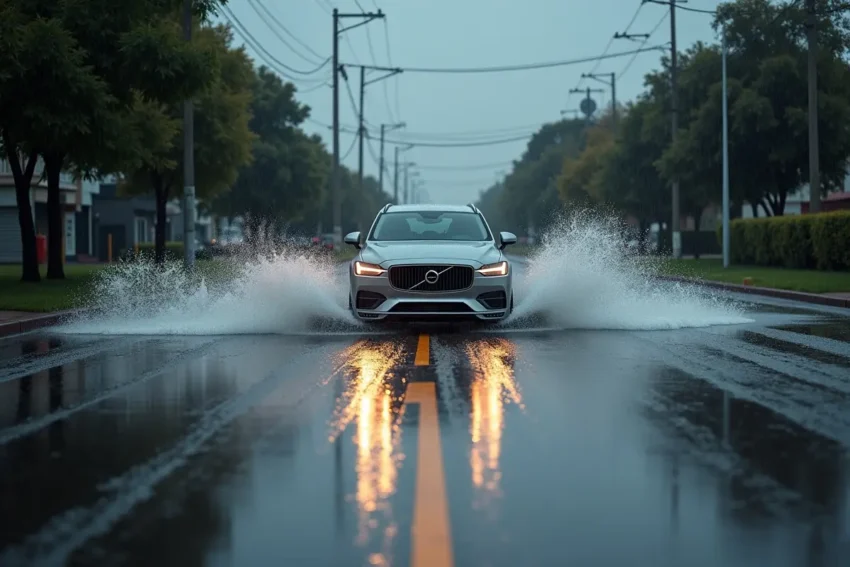Picture this: you are driving home in the rain when suddenly your tires lose grip and your car begins to slide across the pavement. This frightening experience, known as hydroplaning, often happens when water collects on roads that are not draining properly.
A car accident lawyer in Dallas will tell you that in some cases, responsibility may not rest solely with the driver. Poor road design or inadequate maintenance can significantly contribute to these accidents. Understanding how liability works can make all the difference if you ever find yourself in this situation.
What Hydroplaning Really Means
Hydroplaning occurs when a layer of water forms between your tires and the road, causing your car to lose traction. It can feel like your vehicle is gliding uncontrollably, even if you are holding the wheel steady. The scary part is that it can happen to anyone, even careful drivers, when road conditions are poor.
The Role of Road Drainage
Roads are designed with drainage systems that move rainwater away, allowing vehicles to maintain traction. When drains are clogged or the pavement is uneven, water can pool, creating hazardous conditions. Poor drainage increases the risk of hydroplaning and can raise questions about who is truly responsible for an accident.
When Drivers May Be Held Responsible
Even though poor drainage can contribute to hydroplaning accidents, drivers can still be found at fault if their own actions exacerbate the situation. Here are some of the most common reasons a driver may be held responsible:
Driving Too Fast for Conditions
Even if the speed limit is posted at 60 mph, that does not mean it is safe to drive that fast in heavy rain. Courts may consider a driver negligent if they failed to slow down when wet roads clearly required more caution.
Poor Vehicle Maintenance
Worn or bald tires make it much easier for a car to lose contact with the road during rain. Drivers are expected to maintain their vehicles properly, so failing to replace tires or check brakes can put liability back on them.
Distracted Driving
Using a phone, adjusting the radio, or taking eyes off the road for even a few seconds can make it impossible to react when hydroplaning starts. If distraction played a role, the driver may be held accountable for not paying attention to dangerous conditions.
When Local Authorities May Be Liable
Local governments have a responsibility to keep roads in reasonably safe condition for drivers. If they fail to address known drainage problems or maintain the roadway, they may be held liable for hydroplaning accidents.
Failure to Maintain Proper Drainage
Cities and counties are expected to keep storm drains clear and ensure water flows off the roadway. When drains are left clogged or neglected, standing water can create hazards that lead directly to accidents.
Road Design Issues
Poorly designed roads that do not allow water to drain properly can create persistent problem areas. If the design flaw has been known and left uncorrected, local authorities may be considered negligent.
Delays in Fixing Reported Problems
When citizens or inspectors report flooding or drainage concerns, authorities are expected to respond within a reasonable time. If they ignore repeated complaints or delay repairs, they may be held accountable if an accident occurs.
When Contractors or Third Parties May Share Fault
Sometimes responsibility does not fall only on drivers or local authorities. Contractors or even private property owners can contribute to dangerous road conditions that increase the likelihood of hydroplaning.
Construction Companies and Road Work
Contractors who build or repair roads are expected to follow proper engineering standards. If they cut corners or fail to install adequate drainage, they may be liable for accidents that occur in those areas.
Private Property Owners
In some cases, water from a private property, such as a business parking lot or residential development, can spill onto a public road. If that runoff creates standing water that leads to hydroplaning, the property owner may share responsibility for resulting accidents.
Proving Legal Liability in Hydroplaning Cases
Proving liability in a hydroplaning case often hinges on demonstrating what actually caused the accident. Evidence like photos of standing water, maintenance records, or expert testimony can help prove that poor drainage played a role. Lawyers also examine comparative fault rules to determine how responsibility might be apportioned among drivers and other parties involved.
Steps to Take After a Hydroplaning Accident
The moments after a hydroplaning crash can feel overwhelming, but the steps you take right away can make a big difference. Acting quickly helps protect your safety, your rights, and any future legal claim.
Document the Scene
Take photos or videos of the roadway, standing water, vehicle damage, and any visible injuries. This evidence can be crucial in showing that poor drainage contributed to the accident.
Seek Medical Care
Even if you feel fine, some injuries take hours or days to show symptoms. Getting checked by a doctor right away ensures your health is protected and creates a medical record that supports your claim.
Gather Witness Information
If anyone witnessed the incident, please ask for their name and contact details. Witness statements can add credibility to your version of events and strengthen your case.
Contact an Experienced Attorney
A lawyer who understands road condition cases can guide you through the process and deal with insurance companies. They can also investigate whether poor drainage or another party’s negligence was a factor in your crash.
Conclusion
Hydroplaning accidents are scary, but they are not always the driver’s fault. Poor drainage or neglected road conditions can shift responsibility, and knowing your rights is the first step toward protecting yourself. If you ever find yourself in this situation, a car accident lawyer in Dallas can help you understand your options and fight for the compensation you deserve.

